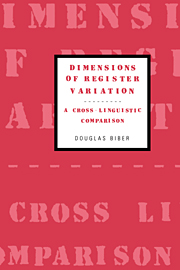Book contents
- Frontmatter
- Contents
- List of figures
- List of tables
- Acknowledgments
- List of abbreviations
- 1 Introduction
- 2 The comprehensive analysis of register variation
- 3 Sociocultural description of the four language situations
- 4 The linguistic bases of cross-linguistic register comparisons: a detailed quantitative comparison of English and Somali registers
- 5 Methodology
- 6 Multi-Dimensional analyses of the four languages
- 7 Cross-linguistic patterns of register variation: synchronic similarities and differences
- 8 Cross-linguistic patterns of register variation: diachronic similarities and differences
- 9 Registers and text types in English and Somali
- 10 Towards cross-linguistic universals of register variation
- Appendix I Grammatical description of linguistic features in Korean. Yong-Jin Kim
- Appendix II Grammatical description of linguistic features in Somali. With Mohamed Hared
- Notes
- References
- Index
2 - The comprehensive analysis of register variation
Published online by Cambridge University Press: 07 September 2009
- Frontmatter
- Contents
- List of figures
- List of tables
- Acknowledgments
- List of abbreviations
- 1 Introduction
- 2 The comprehensive analysis of register variation
- 3 Sociocultural description of the four language situations
- 4 The linguistic bases of cross-linguistic register comparisons: a detailed quantitative comparison of English and Somali registers
- 5 Methodology
- 6 Multi-Dimensional analyses of the four languages
- 7 Cross-linguistic patterns of register variation: synchronic similarities and differences
- 8 Cross-linguistic patterns of register variation: diachronic similarities and differences
- 9 Registers and text types in English and Somali
- 10 Towards cross-linguistic universals of register variation
- Appendix I Grammatical description of linguistic features in Korean. Yong-Jin Kim
- Appendix II Grammatical description of linguistic features in Somali. With Mohamed Hared
- Notes
- References
- Index
Summary
Requirements of a comprehensive analytical framework for studies of register variation
A comprehensive analysis of register variation in a language must be based on an adequate sampling of registers, texts, and linguistic features:
registers: the full range of the registers in the language should be included, representing the range of situational variation;
texts: a representative sampling of texts from each register should be included;
linguistic features: a wide range of linguistic features should be analyzed in each text, representing multiple underlying parameters of variation.
Although there have been many important register studies, few previous analyses of register variation are comprehensive in this sense.
The restrictions of previous research, and the need for more comprehensive analyses, have been noted by several scholars. Characterizing the state of research in 1974, Hymes notes that ‘the fact that present taxonomic dimensions consist so largely of dichotomies – restricted vs. elaborated codes,… standard vs. non-standard speech, formal vs. informal scenes, literacy vs. illiteracy – shows how preliminary is the stage at which we work’ (1974: 41). This state of affairs was still largely true in the 1980s. Thus, Schafer (1981: 12) finds it ‘frustrating’ that although previous studies ‘are based on texts produced in particular circumstances by only a few subjects… speaking and writing in only one situation, this doesn't prevent researchers from offering their results as accurate generalizations of universal difference between speaking and writing’.
Information
- Type
- Chapter
- Information
- Dimensions of Register VariationA Cross-Linguistic Comparison, pp. 27 - 37Publisher: Cambridge University PressPrint publication year: 1995
